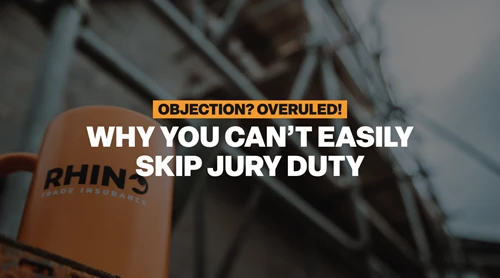Anxiety and stress are two separate but closely connected emotions. While there are clear parallels between the two, there’s also variations in how they make you feel and how they can be managed.
When running your own trades business, you’ll encounter a variety of situations which have the potential to cause or contribute to stress and anxiety.
We’re all familiar with the words, but what’s the difference between stress and anxiety, and what can you do when you find yourself affected by them?
For starters, what is stress?
The body's natural and automatic reaction to a demanding or difficult environment is stress. It is a psychological and physical response that happens when someone feels overpowered or threatened. As it triggers the human body to either fight the danger or run from it, this reaction is typically referred to as the "fight or flight" response.
Many of life’s normal challenges, including employment, money troubles, relationship problems, health challenges, and significant life transitions like moving or starting a new career, can lead to stress. Adrenaline and cortisol are stress hormones released by the body when a person is under stress, and they can have both valuable and damaging effects on the body.
A certain amount of stress is advantageous since it boosts our motivation and gives us the kick in the backside we sometimes need to get out there and tackle life. However, prolonged or excessive stress can have a detrimental influence on both physical and mental health, increasing the risk of heart disease, anxiety, depression, and other conditions.
Looking for ways to avoid burnout? Why not read our helpful article here.
And what is anxiety?
On the other hand, anxiety is a sensation of concern, fear, or unease. It is frequently characterised by excessive worry about commonplace events. A common reaction to stress is anxiety, but it may also indicate a more serious disorder that interferes with daily life.
A category of mental health disorders known as anxiety disorders are characterised by excessive and illogical fear or concern, which can be crippling and impair one's ability to go about daily activities. Generalised anxiety disorder (GAD), social anxiety disorder, panic disorder, and particular phobias are a few examples of anxiety disorders.
The signs and symptoms of anxiety might differ from person to person, but they can include feelings of agitation, excessive concern, exhaustion, attention deficit disorder, irritation, muscle tension, and disturbed sleep. It is possible to treat anxiety disorders with therapy, medicine, or a mix of the two.
How best to deal with stress?
Many people encounter stress often, and this can be harmful to both physical and mental health. Fortunately, stress may be effectively managed in a variety of ways. The following tactics could be useful:
Determine the reason for your stress:
Knowing what is causing your stress will help you find better ways to deal with it.
Practice relaxation methods:
You don’t have to turn into a hippie to benefit from relaxation methods. Basic relaxation methods include simply breathing deeper, noticing things around you (mindfulness) and putting on your favourite music while you’re driving instead of listening to endless annoying radio ads. Further, things like yoga, meditation, deep breathing, and other methods of relaxation can seriously help lower stress and foster a sense of peace.
Regular physical activity:
This will assist in enhancing mood and reducing stress. As a tradesperson, you probably get your fair amount of exercise through your work but don’t forget to stay active in your downtime, too. On most days of the week, try to get in a minimum of 30 minutes of exercise even if it’s just taking the dog on a long walk.
Get sufficient rest:
Sleep is crucial for keeping daytime stress levels down. Ever noticed how snappy and irritable you are after a night of interrupted sleep? Exactly. Each night, try to get between seven and nine hours of sleep.
Maintain a healthy diet:
A varied and balanced diet can support general health and minimise stress. Eat a lot of fresh produce, and don’t rely on fast food (convenient and delicious though it may be) which is generally nutritionally poor and can increase your risk of lots of nasty health problems later in life.
Seek professional assistance:
If you are having trouble controlling your stress yourself, you might want to speak with a mental health expert. You can access resources online or through your GP. They can assist you in creating a personalised strategy to better handle stress.
How to manage anxiety?
Feelings of fear, concern, and unease can be brought on by the widespread mental health disorder known as anxiety. There are numerous techniques that could be useful in regulating your symptoms if you struggle with anxiety. Here are a few to help you get by:
Recognise your anxiety's triggers:
These can be things such as the circumstances, events, or ideas that cause it. This can assist you in creating coping mechanisms and better preparing for these scenarios.
Use relaxation techniques:
Similar to stress, yoga, progressive muscle relaxation, meditation, and deep breathing can all help to calm the mind and ease tension.
Regular physical activity:
Again, similar to stress, regular exercise will assist in boosting your mood and lessen anxiety. On most days of the week, try to get in around 30 minutes of exercise to de-stress and handle anxiety.
Get plenty of sleep:
Sleep is vital for a healthy body and mind. It's also important for controlling anxiety. Seven to nine hours every night will ensure you are on top of your game and staying in the right state of mind.
Limit your intake of caffeine and alcohol:
This is because they can both exacerbate the feelings of anxiety.
Eat a balanced diet:
Eating well can boost general health and lower anxiety. Plenty of fruit, veg, salads and fresh produce will keep you feeling healthy and stable.
Positive affirmations:
Practising positive self-talk can help your mind greatly. Concentrate on your accomplishments and strengths and remind yourself of how well you are doing and how far you have come.
Seek assistance:
Ask for assistance from friends, relatives, or a mental health professional. A support group can be hugely beneficial in helping you manage your anxiety levels, as it always helps to hear that you’re not alone in what you’re going through.
Consider professional advice:
If you're having trouble controlling your anxiety on your own, you might want to think about seeking counselling. Professionals can assist you in creating a customised strategy to better manage your symptoms.
In conclusion, anxiety is a worry or uneasiness that can develop in response to stress, whereas stress is a reaction to a difficult situation. If left untreated, stress and anxiety can both have detrimental impacts on one's physical and mental health. When working in the trade industry, lots of things can happen in one working day - so learning to cope is essential to maintaining a healthy mind and a successful business.
As a tradesperson, knowing that you’re covered by a reliable, friendly insurer goes a long way to reducing your stress levels on the job.
To help manage your business, why not explore what Rhino Trade Insurance has to offer tradespeople like you? With well over 2000 tradespeople in the UK rating our protection options five stars, we have plenty of insurance options to give you that all-important peace of mind.
Call our helpful staff at 0116 243 7904 for more information, or visit our website and utilise our simple online quote builder.




